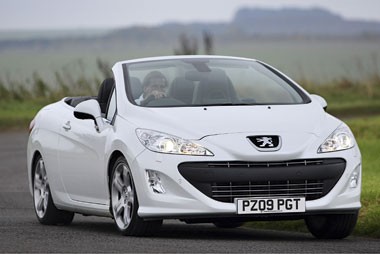Review
The timing of Peugeot’s launch of its latest model – the 308 CC – couldn’t have come at a much more testing moment.
With plummeting new car sales, it is difficult for carmakers to set accurate sales targets for the coming year.
In the coupé-cabriolet market, there has been a massive fall in sales across Europe, with some 50,000 fewer sold last year, bringing the total to just 194,000.
Therefore, setting an accurate target for 308 CC sales is proving very challenging, but this hasn’t stopped the company setting strict sales parameters: it will not allow any to go into short-term rental.
Instead, the coupé-cabriolet, which goes on sale here in May, is predicted to see a significant portion of its full-year 5,000 sales go into the user-chooser market.
While retail sales will still make up the majority of this niche model’s registrations, the user-chooser market is now so important to Peugeot that it expects to see at least 35% of 308 CCs go into the fleet market.
The model, which is estimated to cost between £19,000 and £24,000, will be offered with four familiar Peugeot engines – two 1.6-litre petrols and 1.6 and 2.0-litre diesels.
Of most interest to fleets will be the familiar PSA Group HDi diesel engines, which will be available with either 112bhp or 140bhp, both coupled to a six-speed manual gearbox.
The two variants of this diesel will make up the bulk of fleet sales as they are the only offerings that are below the critical CO2 emissions threshold of 160g/km at 138g/km (112bhp) and 155g/km (140bhp), despite the additional 170kg weight the CC model carries over its hatchback brother.
The other engine offered – a 1.6-litre petrol – has emissions ranging between 163g/km and 177g/km.
There will be three trim levels launched in the UK – the Sport, SE and range-topping GT – with the mid-range and highly specified SE accounting for at least 60% of sales.
The UK is a key market for coupé-cabriolet sales and is beaten only by Germany in terms of numbers sold in any one European country.
Last year, British drivers took delivery of 47,800 coupé-cabriolets, although now there are some 17 variants on offer from a variety of manufacturers, several of which are direct mainstream competitors to Peugeot.
Despite falling sales, Peugeot is still going to make 160 308 CCs a day and believes it will sell 35,000 in a full year across the globe.
Here it is turning much of its attention to increasing the fleet sales of its full range.
Evidence of this can be seen in the change of practice with the 308 CC launch.
“We have never spoken so much to lease companies than in the last six months,” said product manager Steve Fahey.
In fact, British lease companies were the first to see the car in detail at a static launch just days after the world had got its first glimpse of the 308 CC at the Paris Motor Show last September.
Behind the wheel
Peugeot has obviously worked hard to improve comfort and build quality levels in the 308 CC.
The cabin is refined, well built and has a touch of luxury, especially with the optional leather and chrome trim.
However, you do have to pay an additional £250 for an electric package, which is recommended so the rather uncomfortable front seats can be fully adjusted.
The front seats have an optional ‘heat scarf ‘ which blows hot air on to the neck of driver and passenger and also comes with head airbags.
The driving experience is not going to set your heart racing with adrenaline.
The engines, either petrol or diesel, are suited to cruising rather than racing.
This suits the CC’s audience perfectly – typically a married female with children no longer at home – as they are looking for the affordable exclusivity of a cabrio, the security of a hardtop and a car that is comfortable racking up the miles.
Visibility is compromised by the super-thick screen pillars which obscure the view when cornering.
The car’s tour de force is, of course, its metal roof. It retracts in just 20 seconds and leaves ample room for luggage when packed away – 266 litres – compared to 465 litres when it is in place.
Peugeot is at pains to promote this as a true four-seat car, but it’s more of a 2+2 with limited leg and headroom in the rear when the roof is fixed.
Verdict
Practicality, safety, affordability and a sub-160g/km 140bhp diesel engine, as well as that touch of style, means the 308 CC should easily achieve its 1,700-plus fleet sales next year.
* For contract hire rates go to comparecontracthire.com
















